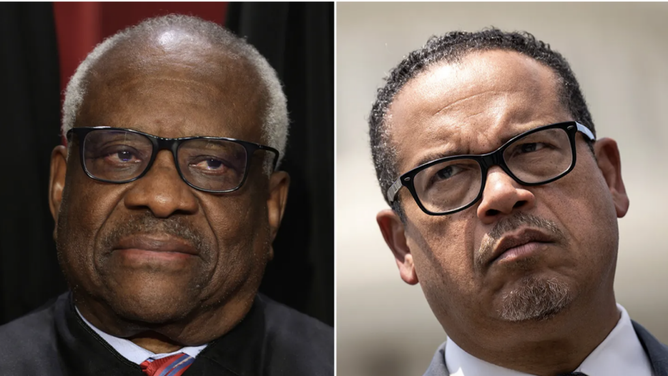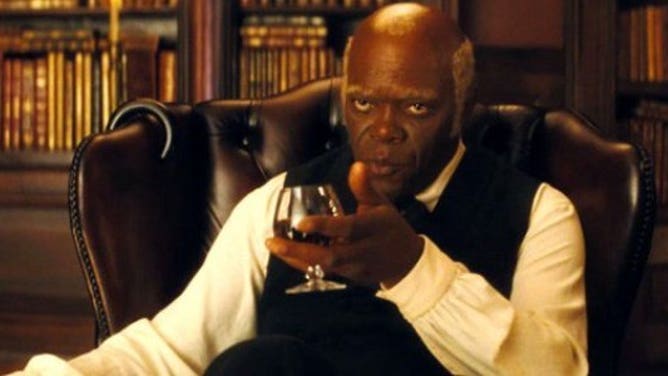Attorney General Calls Clarence Thomas The House Slave In 'Django Unchained'
Now for a case of actual racism.
Democratic Minnesota Attorney General Keith Ellison went on a racially charged rant comparing Supreme Court Justice Clarence Thomas to the epochal house slave in Django Unchained.
Ellison spoke to the Michigan Chronicle in Detroit about Thomas’ views on affirmative action:
"Anybody who’s watched the movie ‘Django,’ just watch Stephen and you see Clarence Thomas," Ellison said. "Clarence Thomas has decided that his best personal interest is siding with the powerful and the special interests regardless as to who they’re going to hurt. He's like, I'm looking out for me, and I don't care nothing about you, but I'm on the Supreme Court so it's my job to look out for you.’ So he's abdicating his responsibility. He has abdicated it a long time ago. When he got in office, he was this way. He's this way now, maybe he's worse now."

Supreme Court Justice Clarence Thomas, left, and Minnesota Attorney General Keith Ellison. (Fox News)
Stephen, played by Samuel L. Jackson, is a slave who helps upholds the dichotomy between his white owner, Leonardo DiCaprio's Calvin Candie, and the black slaves beneath him.
Stephen views himself as second to the white men and above the other black slaves, thus almost appreciative of slavery.
The character has become a point of reference for what the left calls a "black white supremacist."
Stephen is a black white supremacist. Quentin Tarantino wrote him to be one. But Justice Thomas is not.

Stephen from "Django Unchained."
"So, Clarence Thomas needs to be impeached," Ellison continued. "Clarence Thomas is illegitimate and has no basis in the job that he's in. And it's a lesson to us as African Americans. What is the lesson? We all thought, well, he's a black man raised he's in the Deep South. He knows what racism and segregation is, he knows what affirmative action is. He's going to come around one day."
Affirmative action was a political ploy. We discussed how in a column last week:
The Democrat Party all but ensured political advantage for decades when it introduced affirmative action in the 1960s.
As the Civil Rights movement neared an end, Democrats argued that racial equality under the law was not enough and that they alone could keep the racist boogeyman at bay.
Affirmative action enabled the concept of excused racism, which presumes that society must discriminate against certain racial groups to reach racial impartiality.
By definition, affirmative action is the very type of discrimination the Civil Rights movement fought against. But politicians excused it and institutions, especially American universities, practiced it.
Affirmative action enabled what has become "excused racism."
Harvard is considered the most prestigious university in the United States. And for nearly half a century, skin color determined a Harvard applicant’s chances of admission. In the top academic decile, Asian applicants have a 12.7 percent chance of admission. Whites have a 15.3 percent chance. Latinos a 31.3 chance. Meanwhile, a black applicant has a 56.1 chance.
Affirmative action hindered the success rate of many black students:
According to an Atlantic study, affirmative action had actually hindered the success rate of black students. See, affirmed students are far more likely to drop out of college than those who attend a college for which they are suited.
“Blacks who start college interested in pursuing a doctorate and an academic career are twice as likely to be derailed from this path if they attend a school where they are mismatched (meaning accepted through affirmative action),” the study stated.
Excused racism has not uplifted the black community – but it has lifted up enough useful black Americans who make it seem as though it has.
Ultimately:
Excused racism has hamstrung the progression of society and reduced all people to the color of their skin.
Affirmative action, ESG, and equity deliberately made us a more racist society, one vulnerable to the whims of the elites.
The end of the Civil Rights Movement in the 1960s threatened the demand for racial control. Thereby Democrats first excused racism in the name of affirmative action, ensuring an insatiable need for ever more racial governance.
You can read the full column below:
Affirmative action made us a more racist society, allowing institutions to reward and punish us based on skin color.
That, not equal rights, is what Justice Thomas opposes.
And calling a black person who disagrees with the progressive movement a "Stephen" or "Uncle Tom" is, by definition, racist. Doing so advances the idea that all black people must think alike, and those who don't are arbitrated by white superiors.